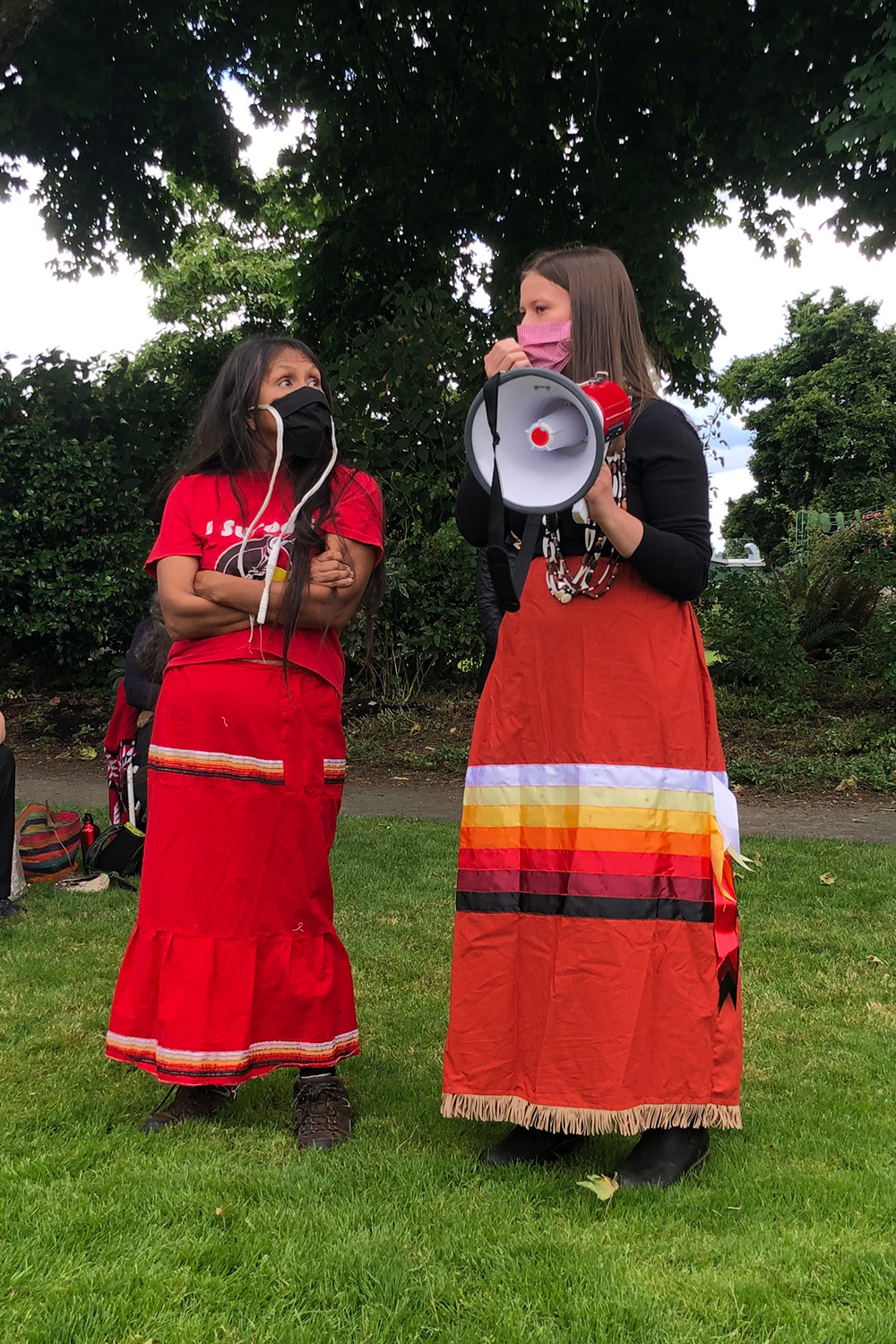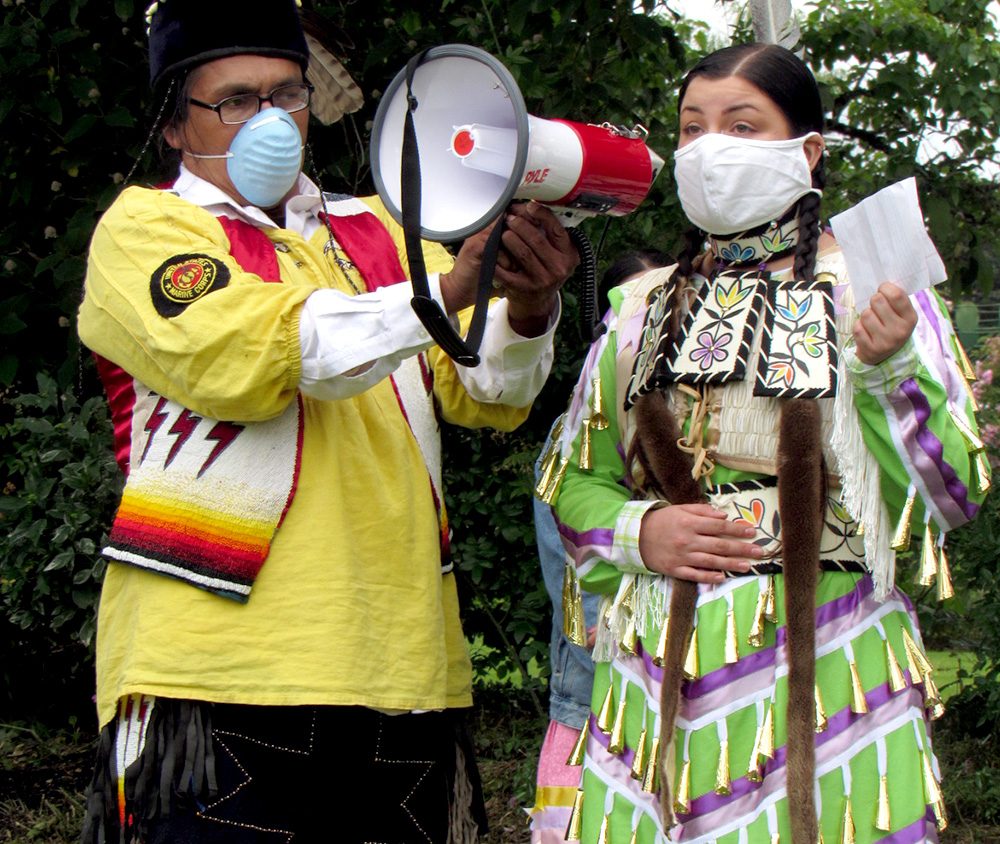Violet Johnson spoke into a megaphone, wearing a striped Cheyenne-Arapaho style ribbon skirt and strings of beads hanging from her neck.
In the crowd of more than 100 people, a woman held a sign: a black fist raised up, holding a feather. “In solidarity, we rise,” the sign said. “#BLM #MMIW,” for Black Lives Matter, Missing and Murdered Indigenous Women.
Johnson spoke about the inextricable historical ties between the Black and Indigenous communities in America at the Owen Rose Garden on June 28. She’s part of the Hupa and Yurok tribes from Northern California.
“This nation was built on stolen labor and stolen land,” she said, referring to the U.S. history of slavery of Black people and colonization of Native land. Johnson says the U.S. government has never stopped oppressing them.
“We want to highlight George Floyd and all of the other people in the Black community that are being killed by police brutality,” she tells Eugene Weekly. “We also want to highlight Missing and Murdered Indigenous Women, and the way that the government plays a role in both of these violences against us.”
Johnson and other Indigenous women held the rally to raise awareness for missing and murdered Indigenous women and to highlight the routine violence against “two-spirit,” or gender nonbinary people, in solidarity with the Black Lives Matter movement and the overall fight against institutional racism in the U.S.
Missing and Murdered Indigenous Women is an international movement. It aims to raise awareness for the thousands of Indigenous women who are killed or disappear every year in the U.S. According to the FBI National Crime Information Center, about 5,600 Indigenous women were killed or disappeared in 2019 in the U.S. Activists say this is definitely an undercount.
The movement also seeks justice for these women. Out of the 5,700 MMIW women in 2016, only 116 were put into the federal missing persons database, says Johnson, who is the racial justice coordinator at the University of Oregon Women’s Center.
Indigenous people who identify as transgender, lesbian, bisexual or two-spirit are even more likely than Indigenous women to experience violence. According to a 2009 study, 85 percent of these people experienced physical violence in their lives, and 78 percent experienced sexual violence. And according to a 2013 National Institute of Justice study, 84 percent of American Indian and Alaskan Native women have experienced physical violence, and 56 percent have experienced sexual violence.
Jurisdiction complications make prosecuting these cases extremely difficult for Indigenous people. The 1978 Supreme Court ruling for Oliphant v. Suquamish Indian Tribe said that tribal authorities can’t prosecute non-tribal people for crimes, even if the crime was committed on tribal soil. So a white man could rape or kill Indigenous women, and the tribal authorities couldn’t do anything about it. The federal government rarely prosecutes anyone for crimes against Indigenous women, Johnson says, and perpetrators of violence against them often walk free.
Erika Lincango, an Indigenous Ecuadorian 4J teacher, says MMIW is a historical and current problem.
“Murdered and Missing and Indigenous Women is a struggle that’s been here forever, well since 1492,” she says.
Lincango spoke to the crowd about the struggles Indigenous, migrant and undocumented farm workers face near the U.S.-Mexico border. These people, who cross the border to work on U.S. farms, are particularly vulnerable to sex trafficking and violence because they often don’t speak English or Spanish, just their native tongues.
Enlarge

Photo by Jade Yamazaki Stewart
Jane Coverdell, another Indigenous organizer, says that the U.S. government has been whitewashing and killing Indigenous people since its inception.
“I feel like our very survival is an act of protest,” she says. Coverdell, who is a member of the Alaskan Native Tlingit tribe, has an ancestral tattoo on her chin, a mark of tribal pride that she says would have gotten her killed in recent history.
She mentions the government-funded “boarding schools,” re-education camps where hundreds of thousands of stolen Native children were forced to convert to Christianity so as to stop practicing their native religions and to leave their culture and language behind. Most of these schools have closed, but a few of them, including one in Oregon, exist to this day.
“We still lose our children more than just about anybody,” Coverdell says. “The boarding schools never stopped, they just turned into so-called foster care.” She says many Indigenous children are still wrongfully taken from their parents by the Department of Child Protective Services.
After the event at the Rose Garden, Coverdell says the group marched to the Lane County Jail. There, the brother of Charlie Landeros read a poem in his siblings’s honor. Landeros grew up on Kalapuya tribal land, and was shot and killed by Eugene police last year.
On the way back to the Rose Garden, two racist white men heckled the protesters, according to Coverdell. One of them told an Indigenous woman that he liked having sex with animals, but since there weren’t any animals around, he would like to ride her instead. Another pulled his pants and underwear down and started spanking his own butt in front of them. White allies of the Indigenous women bear hugged the white men, picked them up and kept them away from the protesters.
“Allyship is more than a word and a hashtag,” Coverdell says. “We had beautiful, solid, real allies.”
Coverdell reaffirmed that while there is a lot of historic abuse against Indigenous people, the institutionalized racism continues with racist police that target Black and Indigenous men, and racist laws that let Indigenous women die and disappear.
“We were abused in order to bring them their idea of greatness, and now that it no longer serves them, they continue their genocide against us,” Coverdell says. “And they do it with the badge. They do it with the flag.”
